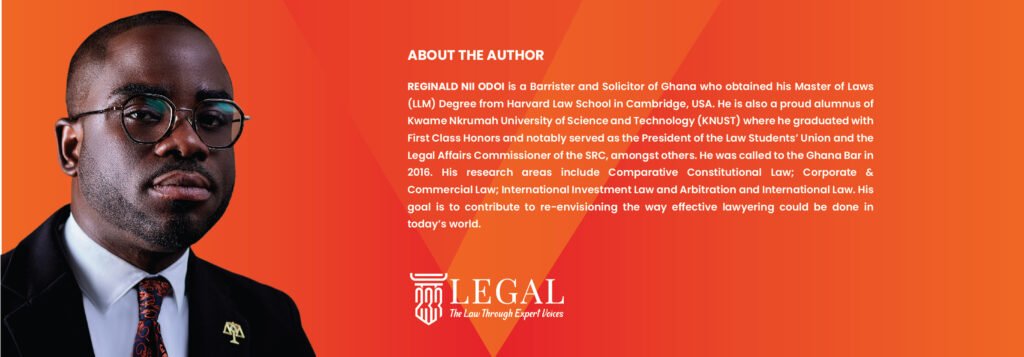

Introduction
We learn resignation not by our own suffering, but by the suffering of others…
Rule of law, as it properly connotes, envisages a system of self-government in which all persons including the organs of government are accountable under the law. It is in similar understanding that the Preamble of the 1992 Constitution of Ghana emphasizes the establishment of a framework of government which “shall secure for ourselves and posterity the blessings of liberty…in solemn declaration and affirmation of our commitment to freedom, justice, probity and accountability.” Indeed, the principle of constitutional supremacy, which our constitution upholds, is fundamental to the rule of law in a democratic society as ours. This principle projects the idea that when public officials, including high-ranking appointees engage in or are alleged to have engaged in wrongdoing that breaches the constitution, such undermines the very fabric of democracy. Accordingly, it should be the duty to resign or quit as a way of promoting accountability and upholding the constitution. Arguably, and for those who are football enthusiasts, it would be realised that football managers and coaches in more developed leagues in the world understand this duty of resigning as being the normal course of action expected when they or the public feel that they have made errors of judgment in management or have failed to manage the tasks assigned to them. This essay thus argues that prima facie evidence of wrongdoing in terms of breach of the constitution should necessitate resignation drawing from a “spiritual” reading of the constitution. As J. Patrick Dobel would say, “resigning from office is a critical ethical decision for individuals. Resignation also remains one of the basic moral resources for individuals of integrity.”
Who is a “Public Officer” within the Ghanaian context
A “public officer” is defined under Article 288 of the constitution as “a person who holds a public office.” Article 295 of the constitution further defines a “public office” to include “an office the emoluments attached to which are paid directly from the Consolidated Fund or directly out of moneys provided by Parliament and an office in a public corporation established entirely out of public funds or moneys provided by Parliament.” Section 7 of the Public Officers Act, 1962 (Act 114) further defines a “public officer” as “a person in the service of the Government or a person in the service of a local authority.” It is quite obvious from the constitution that there are different categories of public officers ranging from public officers who serve in the public services of Ghana under Article 190; to public officers who are agents of the President and serve at his will and pleasure; to public officers who occupy elective positions; to public officers who perform judicial functions. All in all, these public officers are entrusted with the power which emanates from the sovereign will of the people, to act for the welfare of the people of Ghana. Accordingly, ideals of constitutionalism mean that these public officers are to be limited in the exercise of their power and above all, are to be accountable to the people of Ghana for their actions and in-actions. The provisions of the constitution are designed to ensure that government officials act in the best interests of the people. However, when officials engage in unconstitutional behaviour, it can have far-reaching consequences including erosion of public trust and damage to the rule of law. In such cases, the duty to resign becomes essential in promoting accountability and maintaining the integrity of government.
Inferring the duty to resign from Ghana’s constitutional jurisprudence
It is humbly submitted, that an inference can be drawn from the wording of Article 82(5) of the 1992 constitution to the effect that a duty to resign exists as a way of ensuring accountability in government through constitutional adherence. Article 82(5) deals with the revocation of appointment of a Minister of State. It provides that, “Where a vote of censure is passed against a Minister under the article, the President may, unless the Minister resigns his office, revoke his appointment as a Minister.”
Article 82(5) provides a crucial mechanism for promoting accountability in government. Although specifically applicable to Ministers, this provision can be interpreted to underscore a broader principle of public accountability. The article stipulates that a Minister against whom a vote of censure is passed should resign or face revocation of their appointment. This implies that public officers are expected to take responsibility for their actions and be accountable for any wrongdoing. The inclusion of this provision in the constitution highlights the importance of accountability in governance. By requiring a Minister to resign or face removal, the provision promotes a culture of accountability and responsibility amongst all categories of public officers.
This provision can be seen as a reflection of the broader principle of accountability which is essential for maintaining public trust and ensuring that government officials act in the best interests of the people. This principle can and should be extended to all other public officers and by so doing emphasize the need for them to be accountable for their actions. In cases of alleged, perceived or proven wrongdoing, resignation should be seen as a means of taking responsibility and promoting accountability. By resigning, public officers can demonstrate their commitment to upholding principles of integrity even if it means relinquishing their positions.
Comparative examples of the exercise of the duty to resign
A notable example of resignation involved the 37th President of the United States of America, Richard Nixon, who made history by becoming the only commander-in-chief of the US army to resign the office. He was forced out of the White House after the Watergate scandal came to light. Though he had secured re-election, he was forced to resign two (2) years into his second term. He ended up being replaced by his Vice-President, Gerald Ford. The Watergate scandal involved a large campaign of political spying and sabotage carried out to improve the chances of Nixon winning a re-election. Former aides and confidants revealed that he was aware of the Watergate burglary and had recorded all conversations in his office. This led to subpoenas and eventual impeachment by the House of Representatives. It was at that point that Congressional leaders told Nixon to resign because they could not protect him during the Senate trial. He was however pardoned by Gerard Ford when he assumed office.
Another resignation example involves Abe Fortas who was the 41st Supreme Court Justice to resign from the Court. He resigned from the Court on 15th May, 1969 and returned to private practice following an allegation that he took a secret retainer from the family foundation of Wall Street financier Louis Wolfson. The transaction provided that in return for unspecified advice, Fortas was to receive $20, 000 a year for life. The disclosure of this retainer effectively ended his judicial career. He was urged to resign to protect the integrity of the Supreme Court and his wife’s legal career. A portion of his resignation letter read as follows: “It is my opinion, however, that the public controversy relating to my association with the Foundation is likely to continue and adversely affect the work and position of the Court, absent my resignation. In these circumstances, it seems clear to me that it is not my duty to remain on the Court, but rather to resign in the hope that this will enable the Court to proceed with its vital work free from extraneous stress…So far, I am convinced that the welfare and maximum effectiveness of the Court to perform its critical role in our system of government are factors that are paramount to all others. It is this consideration that prompts my resignation which, I hope, by terminating the public controversy, will permit the Court to proceed with its work without harassment of debate concerning one of its members.”
Conclusion
The idea that a Minister or public officer would sooner resign than be expelled aligns with the idea of an underlying duty to resign as a way of promoting accountability through constitutional adherence. Men and women of integrity leave office when a scandal brews or is in the offing. Some resign from office because they do not support a government policy issue. All in all, the idea of this essay is to abhor the idea of clinging so much to an office as if to lose the office is the end of the world. It is submitted that it is important to avoid creating a breed of lackeys by institutionalising incompetence, greed, corruption and evils which in that respect destroy democracy. In conclusion, prima facie evidence of wrongdoing in terms of breach of the constitution should necessitate resignation from office. By resigning in the face of wrongdoing, public officers can help maintain the integrity of government, uphold the rule of law and promote a culture of responsibility and accountability. Ultimately, the duty to resign is essential in ensuring that public officers act in the best interests of the people and upholds principles of democracy.
God bless!












